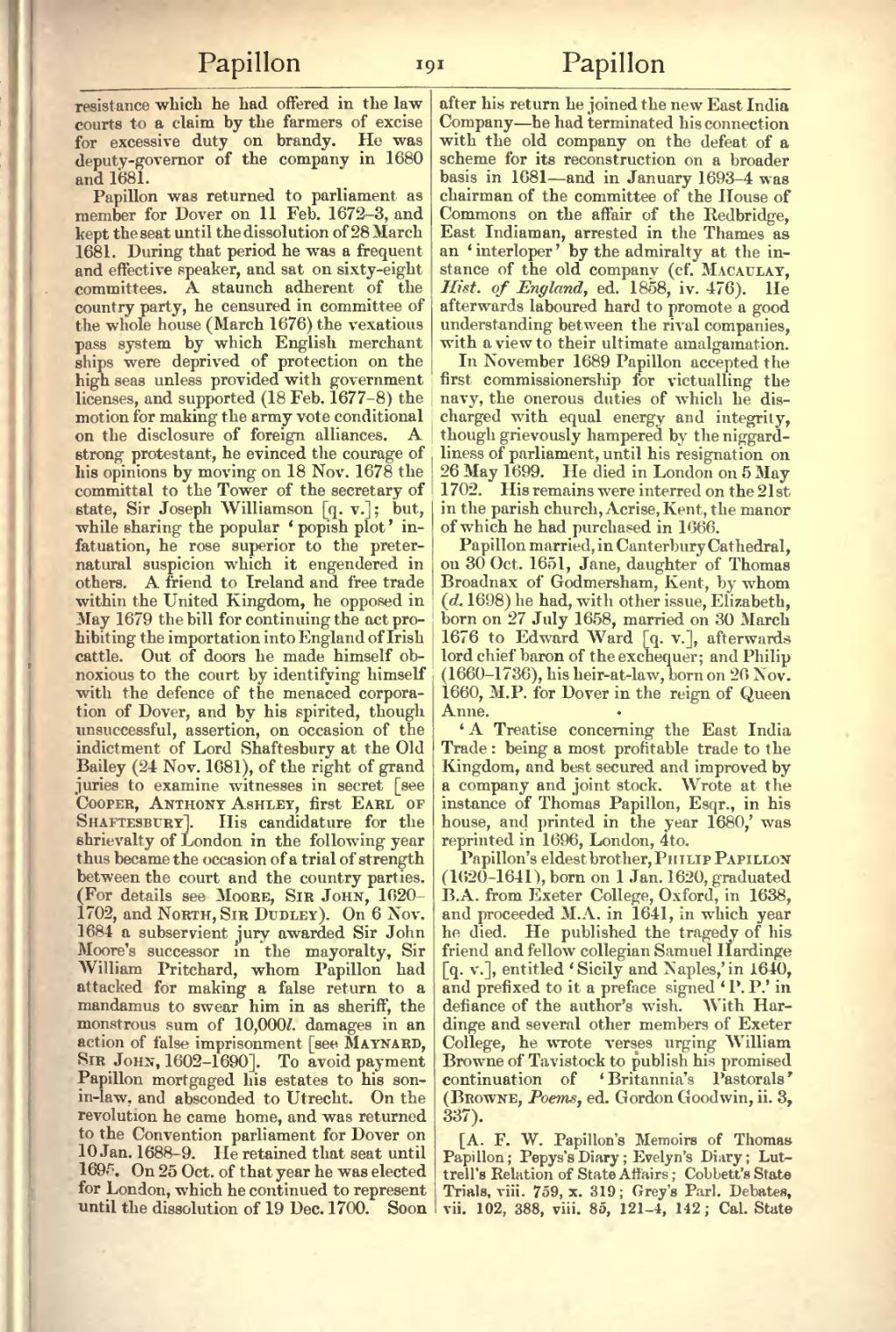resistance which he had offered in the law courts to a claim by the farmers of excise for excessive duty on brandy. He was deputy-governor of the company in 1680 and 1681.
Papillon was returned to parliament as member for Dover on 11 Feb. 1672–3, and kept the seat until the dissolution of 28 March 1681. During that period he was a frequent and effective speaker, and sat on sixty-eight committees. A staunch adherent of the country party, he censured in committee of the whole house (March 1676) the vexatious pass system by which English merchant ships were deprived of protection on the high seas unless provided with government licenses, and supported (18 Feb. 1677–8) the motion for making the army vote conditional on the disclosure of foreign alliances. A strong protestant, he evinced the courage of his opinions by moving on 18 Nov. 1678 the committal to the Tower of the secretary of state, Sir Joseph Williamson [q. v.]; but, while sharing the popular ‘popish plot’ infatuation, he rose superior to the preternatural suspicion which it engendered in others. A friend to Ireland and free trade within the United Kingdom, he opposed in May 1679 the bill for continuing the act prohibiting the importation into England of Irish cattle. Out of doors he made himself obnoxious to the court by identifying himself with the defence of the menaced corporation of Dover, and by his spirited, though unsuccessful, assertion, on occasion of the indictment of Lord Shaftesbury at the Old Bailey (24 Nov. 1681), of the right of grand juries to examine witnesses in secret [see Cooper, Anthony Ashley, first Earl of Shaftesbury]. His candidature for the shrievalty of London in the following year thus became the occasion of a trial of strength between the court and the country parties. (For details see Moore, Sir John, 1620–1702, and North, Sir Dudley). On 6 Nov. 1684 a subservient jury awarded Sir John Moore's successor in the mayoralty, Sir William Pritchard, whom Papillon had attacked for making a false return to a mandamus to swear him in as sheriff, the monstrous sum of 10,000l. damages in an action of false imprisonment [see Maynard, Sir John, 1602–1690]. To avoid payment Papillon mortgaged his estates to his son-in-law, and absconded to Utrecht. On the revolution he came home, and was returned to the Convention parliament for Dover on 10 Jan. 1688–9. He retained that seat until 1695. On 25 Oct. of that year he was elected for London, which he continued to represent until the dissolution of 19 Dec. 1700. Soon after his return he joined the new East India Company—he had terminated his connection with the old company on the defeat of a scheme for its reconstruction on a broader basis in 1681—and in January 1693–4 was chairman of the committee of the House of Commons on the affair of the Redbridge, East Indiaman, arrested in the Thames as an ‘interloper’ by the admiralty at the instance of the old company (cf. Macaulay, Hist. of England, ed. 1858, iv. 476). He afterwards laboured hard to promote a good understanding between the rival companies, with a view to their ultimate amalgamation.
In November 1689 Papillon accepted the first commissionership for victualling the navy, the onerous duties of which he discharged with equal energy and integrity, though grievously hampered by the niggardliness of parliament, until his resignation on 26 May 1699. He died in London on 5 May 1702. His remains were interred on the 21st in the parish church, Acrise, Kent, the manor of which he had purchased in 1666.
Papillon married, in Canterbury Cathedral, on 30 Oct. 1651, Jane, daughter of Thomas Broadnax of Godmersham, Kent, by whom (d. 1698) he had, with other issue, Elizabeth, born on 27 July 1658, married on 30 March 1676 to Edward Ward [q. v.], afterwards lord chief baron of the exchequer; and Philip (1660–1736), his heir-at-law, born on 26 Nov. 1660, M.P. for Dover in the reign of Queen Anne.
‘A Treatise concerning the East India Trade: being a most profitable trade to the Kingdom, and best secured and improved by a company and joint stock. Wrote at the instance of Thomas Papillon, Esqr., in his house, and printed in the year 1680,’ was reprinted in 1696, London, 4to.
Papillon's eldest brother, Philip Papillon (1620–1641), born on 1 Jan. 1620, graduated B.A. from Exeter College, Oxford, in 1638, and proceeded M.A. in 1641, in which year he died. He published the tragedy of his friend and fellow collegian Samuel Hardinge [q. v.], entitled ‘Sicily and Naples,’ in 1640, and prefixed to it a preface signed ‘P. P.’ in defiance of the author's wish. With Hardinge and several other members of Exeter College, he wrote verses urging William Browne of Tavistock to publish his promised continuation of ‘Britannia's Pastorals’ (Browne, Poems, ed. Gordon Goodwin, ii. 3, 337).

